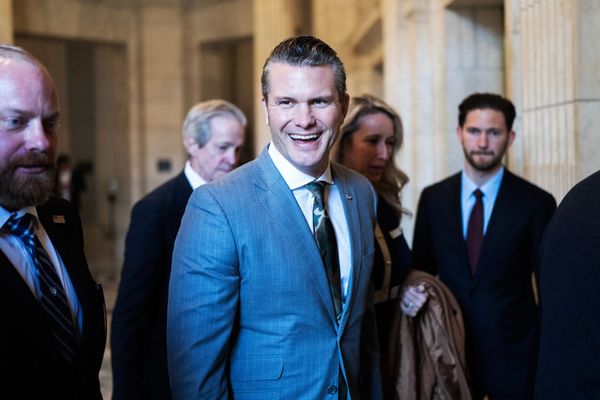/media/img/mt/2022/03/image_22/original.png)
At the close of Nina Morrison’s confirmation hearing, Democratic Senator Sheldon Whitehouse of Rhode Island had a question. “Does ‘tough on crime’ include convicting the innocent?”
“No, Senator, it does not,” replied Morrison, who has been nominated for a judgeship on the U.S. District Court for the Eastern District of New York.
The rest of the hearing prior to Whitehouse’s query indicated otherwise. Morrison, who has dedicated her career to the Innocence Project, and helped free dozens of people who were wrongly convicted, found herself being blamed by Republican senators for a rise in crime that began when Donald Trump was still in office. The fact that the Innocence Project’s work is exonerating those who did not commit the crime they were convicted of didn’t matter.
Senator Ted Cruz of Texas said to Morrison that the rise in crime was “the direct result of the policies you’ve spent your entire lifetime advancing.” Missouri’s Senator Josh Hawley told Morrison, “I will oppose you and anyone else the administration sends to us who do not understand the necessity of the rule of law.” Hawley’s definition of the “rule of law” apparently includes sending people to prison for crimes they did not commit, not all that surprising for someone who believes democracy is when you encourage a mob to overturn an election that your preferred candidate lost.
Republicans want to blame the rise in crime on liberal permissiveness, copying a political playbook that worked extraordinarily well from the 1960s to the turn of the century. As HuffPost’s Jennifer Bendery writes, the attack on Morrison is related to the Republicans’ war against liberal prosecutors, who have been elected on promises to be lenient on crimes like marijuana possession and to prosecute police misconduct. They also don’t like that President Joe Biden has nominated more defense attorneys as judges than his predecessor, bringing a needed balance to a federal bench stacked with former prosecutors.
Republican senators are likely to attack Ketanji Brown Jackson, Biden’s nominee to replace Justice Stephen Breyer on the Supreme Court, on similar terms. In his written questions to Jackson during her prior nomination, to the D.C. Circuit Court of Appeals, Republican Senator Ben Sasse of Nebraska asked whether Jackson’s “work as an Assistant Federal Public Defender would result in more violent criminals—including gun criminals—being put back on the streets?” Jackson would be the first public defender appointed to the Supreme Court in its history, in part because of arguments like these, which imply that due process protects only criminals. Jackson, for her part, responded that “the primary concern of lawyers who work as public defenders is the same as that of the Framers who crafted the Sixth Amendment of the Constitution.”
[Read: Biden’s likeliest Supreme Court pick]
Preventing wrongful convictions shouldn’t be a partisan culture war issue and hopefully will not become one as a result of ambitious Republicans doing Trump impersonations; most states have wrongful-conviction laws, and some right-wing groups, like the Cato Institute, have done admirable work on criminal-justice issues. But nonetheless, some on the right believe that the justice system should prioritize efficient incarceration over certain culpability. That is, they believe it’s more important that the system be good at locking people up than good at making sure those who get locked up are actually guilty. The rhetoric at Morrison’s hearing reflects a view among some conservatives that America’s criminal-justice system is too easy on defendants, and that the Constitution’s due-process protections could use a couple of passes with a black Sharpie.
The 2019 case Garza v. Idaho, which involved a defendant whose attorney did not file an appeal despite his request, because the defendant had earlier signed a waiver agreeing not to appeal, offers an illustration of this position. In that case, a majority found that the defendant’s Sixth Amendment rights had been violated. Three justices—Clarence Thomas, Neil Gorsuch, and Samuel Alito—dissented, with Gorsuch joining part of Thomas’s dissent suggesting that the 1963 case Gideon v. Wainwright, which guaranteed a right to counsel for those who could not afford to pay, should be overturned. “The Court has read the Constitution to require not only a right to counsel at taxpayers’ expense, but a right to effective counsel,” Thomas complained, adding that “the right to counsel is not an assurance of an error-free trial or even a reliable result … Our ever-growing right-to-counsel precedents directly conflict with the government’s legitimate interest in the finality of criminal judgments.”
On the one hand, it is true that human fallibility means that a mistake might be made at trial that does not compromise the integrity of the entire process. But on the other hand, the idea that a “reliable result” in a criminal trial is less important than “the finality of criminal judgments” turns Thomas’s argument into a long-winded paraphrase of Stephen Colbert’s quip that “due process is just a process that you do.”
The core of this assertion is that at the time of the nation’s founding, lawyers were not as regularly a part of the process as they are now, and that the Sixth Amendment guarantees a right to pay an attorney to represent you, not to have one in the first place. Public defenders today are popularly understood as an essential part of the legal system, and the Gideon decision was unanimous, but the idea of a right to counsel was once incredibly unpopular, and remains so among some conservative elites. Not until 1932 did the Supreme Court begin interpreting the Sixth and Fourteenth Amendments as requiring states to provide defense counsel in cases involving the death penalty, and not until 1963, in Gideon, did the Court find a right to an attorney in other cases. Before then, as the Vanderbilt law professor Sara Mayeux writes in Free Justice, many attorneys thought that the idea of public defenders “smacked of communism and would lead to the socialization of the legal profession.”
Thomas’s lengthy explication of the history of the right to counsel begins with a recitation of English common law and then grows thin when he gets to 1932. That’s when the Supreme Court overturned the wrongful convictions of the nine Black “Scottsboro Boys,” who were falsely accused of raping two white women. The case, Powell v. Alabama, was the first to establish a right to counsel in death-penalty prosecutions. By the time of Gideon, the necessity of representation in criminal trials, given the evolution of the legal system, was clear to all of the justices, in part because what passed for trials in the Jim Crow South illustrated how the system worked in practice, and not just in the abstract. As Mayeux writes, both the evils of segregation and a Cold War–era politics that wanted to contrast American due process with the arbitrary nature of Soviet show trials created the political climate in which the public-defender system emerged.
It’s worth noting here that Thomas is correct—if selectively concise—about the history of the right to counsel, which, based on his originalist philosophy, leads him to suggest that Gideon should be overturned. Originalists often maintain that their approach is the only one that respects the rule of law. But in the present, where legal proceedings are much more complex than in the 18th century and prosecutors possess a tremendous amount of coercive power, legal proceedings in America would be far more lawless without a right to counsel than they currently are. Forcing people who cannot afford counsel to represent themselves would defeat the entire point of the due-process guarantees in the Constitution, which are meant to prevent arbitrary imprisonment and punishment. Hardly anyone who can afford a lawyer goes without one—including lawyers. For example, John Eastman, the former Thomas clerk who may be in legal jeopardy because of his role in plotting Trump’s attempt to overthrow the 2020 election, is not scribbling “WE’RE A REPUBLIC NOT A DEMOCRACY” on scraps of paper and sliding them across a table. He has a lawyer.
“Reason and reflection, require us to recognize that, in our adversary system of criminal justice, any person haled into court, who is too poor to hire a lawyer, cannot be assured a fair trial unless counsel is provided for him,” Justice Hugo Black wrote in the Gideon decision. “This seems to us to be an obvious truth.” Not so anymore. As the attorney Lisa Needham writes at Balls and Strikes, “The common thread of these lines of attack is that poor people do not deserve the same constitutional protections afforded to everyone else.”
[Read: Innocence is irrelevant]
But, as Mayeux writes, “By the end of the twentieth century, the Supreme Court could observe that it was virtually impossible for ‘an unaided layman’ to prevail in court; every criminal defendant required ‘a guide through complex legal technicalities.’ Under modern conditions, ‘the assistance of counsel’ was nearly ‘a requisite to the very existence of a fair trial.’” Of course, that’s only a problem if you care whether most trials are fair.
The Founders wrote the Constitution’s due-process protections specifically with an eye toward preventing “judicial despotism” through “arbitrary methods of prosecuting pretended offenses, and arbitrary punishments upon arbitrary convictions,” as Alexander Hamilton wrote in “Federalist No. 83.” Benjamin Franklin famously paraphrased Sir William Blackstone’s maxim that “it is better a hundred guilty persons should escape than one innocent person should suffer.” Those attacking the Constitution’s due process protections and the attorneys who uphold them are employing the reverse logic, that the purpose of the criminal-justice system is to act as a rubber stamp on imprisonment for those who lack the virtue to be wealthy enough to afford representation. Cruz’s and Hawley’s attacks on Morrison go even further, suggesting that destroying the lives of innocent people is worth cutting a few points in the crime rate.
Finality is not something the American criminal-justice system has much trouble with. Fans of Law & Order might have the impression that wily defendants and their corrupt lawyers are constantly getting away with crimes, but in practice, trials are extremely rare; upwards of 90 percent of state and federal prosecutions are settled by plea bargain, a process that did not exist at the time of the founding. Originalists know that but tend to accept plea bargains because trials in every case would render the system nonfunctional, and unlike environmental regulations or voting-rights laws, the conveyor belt of mass incarceration is one aspect of government they don’t want to toss a wrench into.
Most of those convicted cannot afford a lawyer and are served by a public-defender system that is typically starved of resources even in the bluest of states, and that must survive deliberate attempts to sabotage it in red ones. Even with the obstacles they face, they tend to be good at their jobs. Nevertheless, this is not a system overly concerned with culpability, which is part of why organizations like the Innocence Project exist in the first place.
But if you believe that the government should be indifferent to whether most of those it deprives of life or liberty are actually responsible, then the last people you want on the federal bench are judges like Nina Morrison, who believes that the Constitution’s due-process protections should actually mean something for those who cannot afford representation from white-shoe law firms. The shame is that they don't mean as much to the senators considering her nomination, or to many of her would-be colleagues on the bench.







